From the tracks recorded at Peter Miller's studio, Chuck initially wanted to put out a 7" EP of four songs titled "Four Songs!" Eventually, it was pared down to a single featuring
Talk To Me b/w Kojak Chair. We had a thousand copies pressed up and immediately dropped off 20, one for each DJ, at KUSF, the University of San Francisco's super cool station devoted to promoting the most au courrant in underground, punk and 'alternative' music. Fully expecting that within 24 hours it would shoot up to heavy rotation status, I was needless to say disappointed that it in fact received virtually zip in airplay.
Undaunted, we continued to play out as often as we could at the Sound of Music in the Tenderloin, the Fab Mab (Mabuhay Gardens) on Broadway, the Hotel Utah south of Mission and Heaven's Gate at the end of Haight St. Along the way, we hooked up with Scott Young, a pot-smoking trombone player from Keuka, Iowa who, while fully capable of tossing off a great solo, often required a nudge to remind him to play.
Eventually, bassist Dave Fisher grew tired of endless rehearsing of fine points and details only to have all hell break loose at a gig. Kevin, released from the basement where his drums were muffled with t-shirts and blankets, would turn into the Incredible Hulk while I would nudge my amp up louder and louder obliterating any trace of Chuck's scrub-board rhythm. With Dave walking, the rest of us were faced with hunting down what would be the fifth bass player or packing it in.
I decided to pick up a bass and join up with my new wave heroes
Exposure, a partnership that lasted about nine months. During that time, Chuck hibernated in his basement and began to work on his vibraphone skills. What eventually emerged was one of his best songs ever:
Why'd the Boy Throw the Clock Out the Window?
Once completed, he put up the money to record it at Peter's and reassembled the band for the occasion. Along with Kevin on drums, me on guitar, Dave on bass, Scott on trombone and Chuck on vibes and rhythm guitar, Chuck enlisted the help of a creepy fellow with virtually no affect on his face to speak of who called himself My Sin on keyboards as well as Peter Strauss, a friend of Dave's, on alto saxophone.
With the recording completed, the band agreed to play one gig together at the Bannam St. Art Gallery on Saturday, March 24, 1984. This gig marked a turning point for Chuck as the response from the odd assortment of artists, writers, musicians and eccentrics was overwhelmingly favorable. Chuck began to feel that his vision of a small town orchestra comprised of a bunch of working class types with a repertoire of roots rock n roll, original two-beats and spoken word songs could actually find an audience.
The set that night, preserved on a Memorex normal bias 90-minute cassette, was as follows:
Everybody's Trying to Be My Baby
All By Myself
If You Love Each Other
A Different Bob
Talk To Me
Blues in G
Jugband Music
Lie To Me
Rodeo Night
Considering a Move to Memphis
Whole Lotta Shakin' Goin' On
Sendin' Up My TimberShortly after, however, Chuck and Jan decided to move back to Rochester. Chuck's father had been having heart problems and had recently undergone open heart surgery (a quadruble bypass, no less). Proximity to his family became paramount and for the two of them the San Francisco phase was over.
Me? I stayed on in S.F. for another six months. By the end of the six months I had no job, no band and a horrible break-up with a girl that put me on everybody's shit list. When Jan called me to say she was pregnant with their first child, I was excited. When my parents asked me to help them pack up our home of 16 years in Oswego because they wanted to move to Rochester too, I made myself available. When Chuck told me he had put together a band in Rochester and there would always be a place for me in it if I came back, it was time to go.
In February of '85 I flew east to my new home.

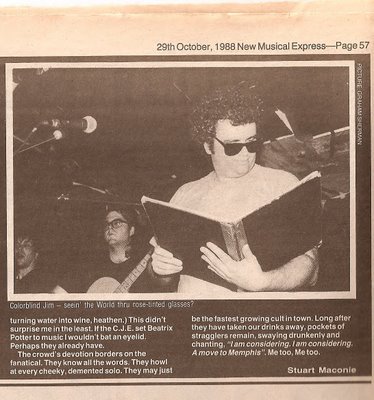


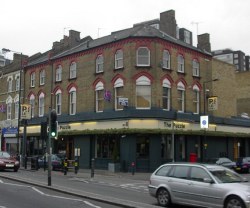

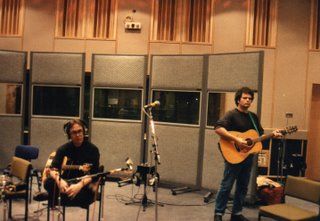

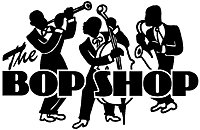



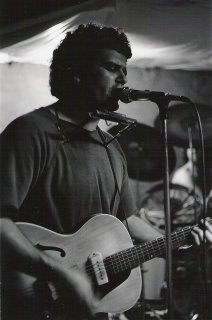 Colorblind James
Colorblind James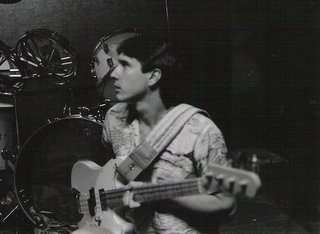 Thaddeus Iorizzo
Thaddeus Iorizzo Phil Marshall
Phil Marshall Kevin McDevitt
Kevin McDevitt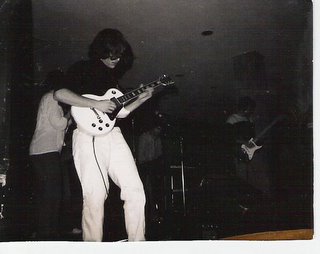 It was the fall of1977 and I was in my third semester at the University of Buffalo. The band was Pretzel which we named in honor of our drummer Jeff "Pretzel" Carlo. The other guitar player pictured here is Jay Goldberg, my best friend during the two years I endured U.B. The singer, standing behind me, is Ginny. She was a theater major and had a very non-rock'n'roll voice but no one else in the band saw themselves as singers.
It was the fall of1977 and I was in my third semester at the University of Buffalo. The band was Pretzel which we named in honor of our drummer Jeff "Pretzel" Carlo. The other guitar player pictured here is Jay Goldberg, my best friend during the two years I endured U.B. The singer, standing behind me, is Ginny. She was a theater major and had a very non-rock'n'roll voice but no one else in the band saw themselves as singers. 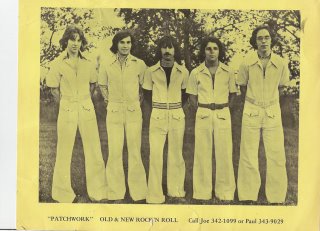 Yes, my friends, that's yours truly on the far right at the ripe old age of 17. From left: Paul Vandish (19) , Bill Barlow (21), Jack Barlow (37) and Joe Trionfero (24). The year was 1976 and I was on the verge of graduating from Oswego High School when I joined up with this "50s, 60s and light rock" band after answering an ad in the Oswego Palladium Times. It was my first band and we landed a regular gig at the Holiday Harbor Hotel playing every Wednesday through Friday night. Saturday night's we played at the Fulton Bowl-a-rama.
Yes, my friends, that's yours truly on the far right at the ripe old age of 17. From left: Paul Vandish (19) , Bill Barlow (21), Jack Barlow (37) and Joe Trionfero (24). The year was 1976 and I was on the verge of graduating from Oswego High School when I joined up with this "50s, 60s and light rock" band after answering an ad in the Oswego Palladium Times. It was my first band and we landed a regular gig at the Holiday Harbor Hotel playing every Wednesday through Friday night. Saturday night's we played at the Fulton Bowl-a-rama. 